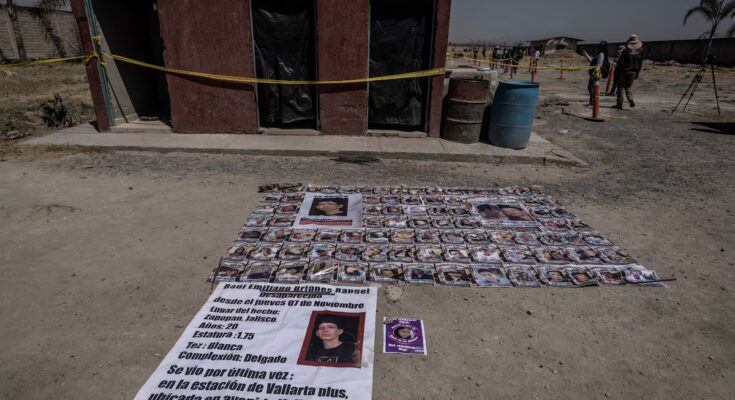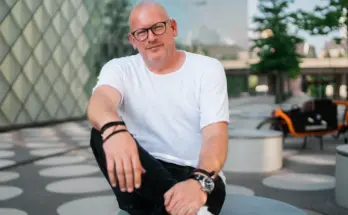A small bone surrounding the pelvis and jaw that corresponds to a person at least 40 years old. They are two of the human remains delivered this Tuesday to his mother Alejandrina Orozco, who since March 2023 has tirelessly searched for her son, Pablo Joaquín Gómez Orozco, 17, a victim of forced recruitment in Nayarit and one of the almost 130,000 missing people in the country. The Jalisco Prosecutor’s Office handed over the remains found since April 2023 to the General Prosecutor’s Office (FGR), but Orozco was unable to return home with his son, because two of those bone pieces do not match his DNA.
Orozco’s story, like that of thousands of Mexican mothers in search of food who dig the earth in every possible corner of Mexico, is a story that goes beyond terror. His son left home in March 2023, in the city of Tepic, to look for work. He never came back. However, he managed to communicate with her through messages from an unknown Facebook account: “Mom, help me, it’s the Jalisco cartel that’s keeping me here,” he told her about seven days after she disappeared.
The tragedy was only just beginning. From that moment until now, Orozco has followed her son’s trail relentlessly and has knocked on the doors of the prosecutor’s offices of Nayarit, Zacatecas, Aguascalientes, Jalisco and, now, those of the FGR, without the process having been easy for her in three years and experiencing a re-victimization that borders on the inhuman.
On the phone, Orozco recounts this long journey in which neither she nor her family found peace of mind: “It was Nayarit, at the time when they didn’t want to take the complaint. When they didn’t want to take responsibility for what had happened here. Because they didn’t do the due diligence in a timely manner. It was Jalisco, because they refused to look for my son saying that he wasn’t missing. That they wouldn’t even look for a cell phone that was later found in the same place where that same phone number gave their last location. It was Jalisco, when he lasted two and a half years with my son’s body without notifying me. It was Zacatecas when he rejected the file three times and didn’t want to and stopped the investigation and until now, with the new prosecutor, that’s when it started to work.
Although the Jalisco Prosecutor’s Office has been in possession of his son’s remains since April 14, 2023, the refusal of the prosecutor of that state, Salvador González de los Santos, throughout this time has been absolute. Until a few months ago. After responding, including through letters in which Jalisco stated that it had no documents relating to any body with the characteristics of Pablo Joaquín, they told Orozco that, finally, his son had been in Lagos de Moreno – a municipality located about 220 kilometers from the capital Guadalajara – for a month after his disappearance.
Upon arriving in Lagos de Moreno, the mother recounted: “They told me: ‘We don’t have the body, Guadalajara has it; besides, there is nothing prepared to give to your son.’ And I said: But then why do you warn me if you didn’t have anything prepared?” Returning to Guadalajara, the mother describes the scene: the director of Semefo, a representative of the Attorney General of Jalisco and three other people from both agencies were present. They apologized to her, offered her all the help and support and confirmed: “Your son is not here, he is in Lagos de Moreno.”
The work of the FGR
Given Orozco’s distrust of Jalisco authorities, he asked the FGR to take over the case. They finally did so only a few months ago, when the remains found in that state were handed over to them for analysis. When questioned by this newspaper, the Forensic Sciences department of Jalisco responded: “Pablo Joaquín was in Altos Norte, the notification was made for the return of the body, but Mrs. Alejandrina, who is his mother, asked for collaboration from the FGR to carry out the genetic study again, so the body was handed over to the FGR experts, who took it to their laboratories”.
Orozco’s wait ended when the FGR called him to inform him that on November 18th they would deliver his son’s body to him in Mexico City. But even there the situation has not improved. “When we all entered the courtroom, I was already very sick. And Mr. Henry Nájera (of the Public Prosecutor’s Office) started yelling at me. He told me ‘If you don’t want to, don’t see it, if you end up like this’. I don’t remember the exact words he said to me, what I remember is that he was yelling at me,” she says.
For the first time, in all these years of waiting, this mother was not alone. The mother assures that the support of the Miguel Agustín Pro Juárez Human Rights Center (Centro Prodh) was decisive. However, as soon as the trial began, Orozco says that forensic specialists from a multidisciplinary team explained to him what he saw: “One of them told me that the tests on the jaw that they sent him are negative, since that jaw belongs to a person of about 40 years old, which is impossible for it to be my son’s. Likewise, another specialist explains to me that there is a duplicate bone, one around the pelvis. He tells me that they sent him the same bone twice, that one corresponds to Pablo Joaquín and the other is not his”.
By order of the Public Prosecutor, connected to the FGR, Orozco had already contracted the funeral services to a company in Nayarit, in a sort of condition that the Prosecutor’s Office would assume the costs and she and her family would not have to pay them. If she didn’t hand over the invoice for all the funeral arrangements, she would have to pay for everything. “On the part of the forensic medical service (Semefo) there is nothing to say. They did their job very well, but on the part of the FGR no… However well they did their job, I no longer trust anyone.”


